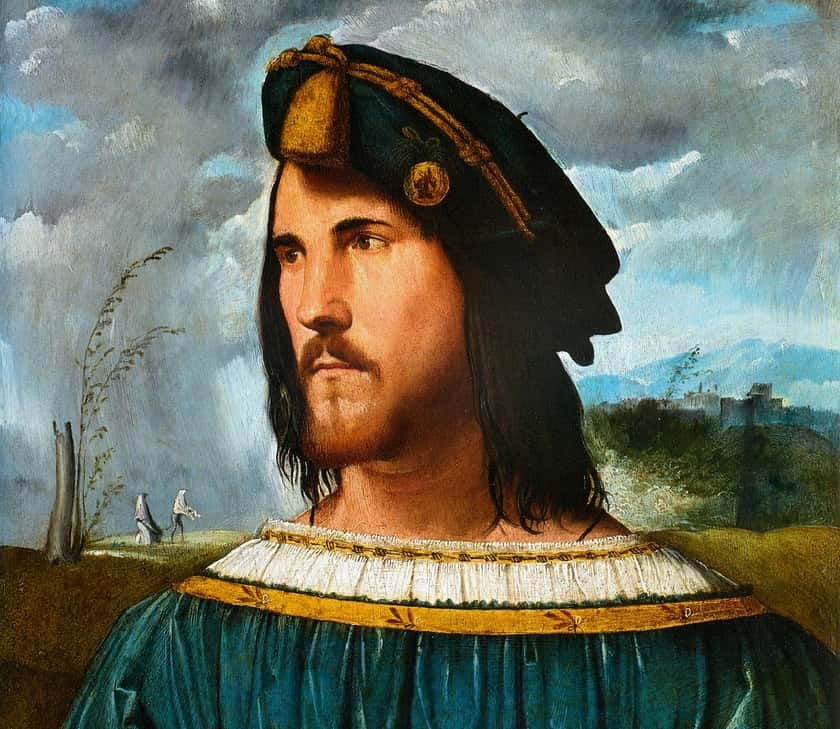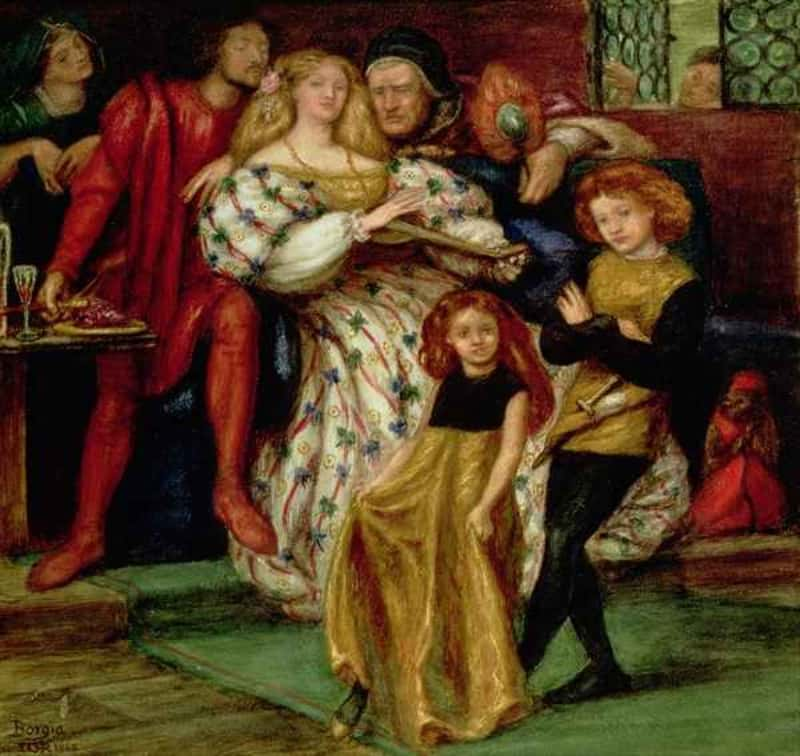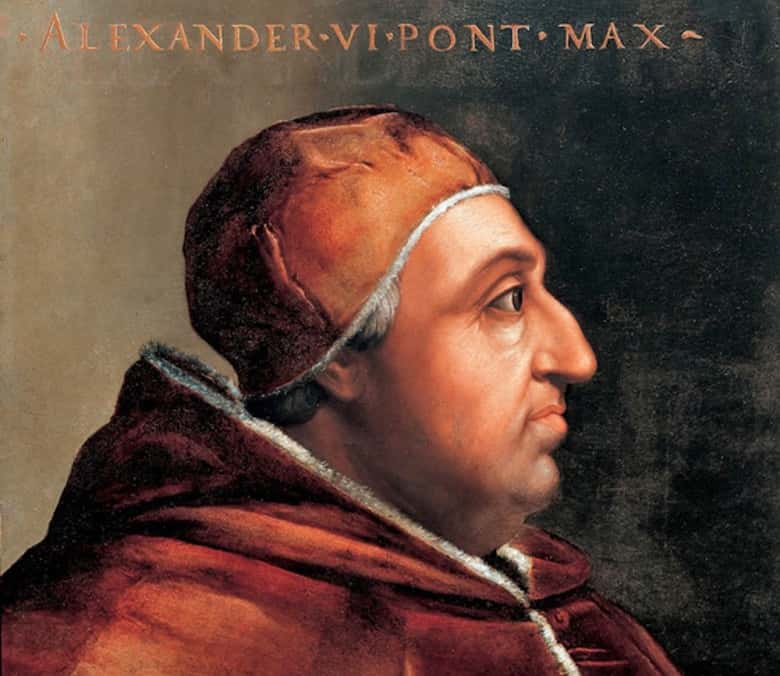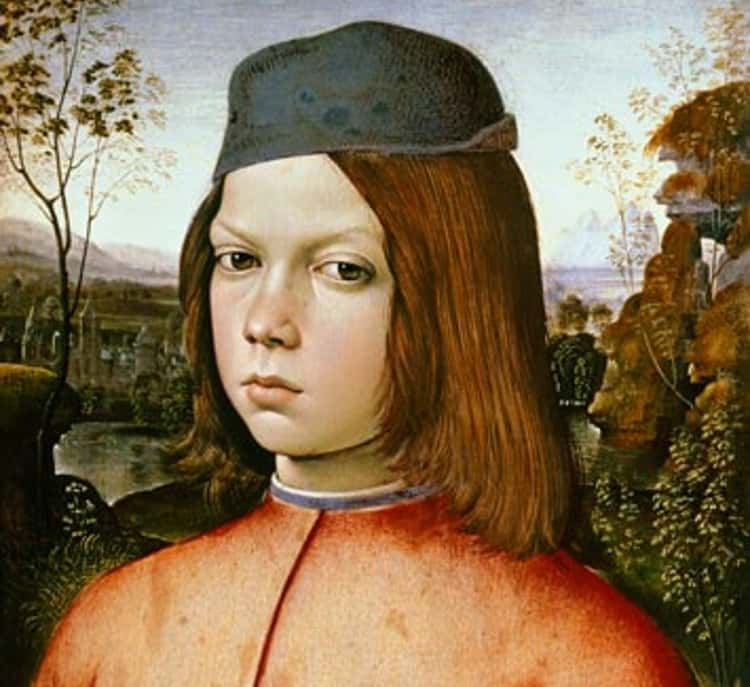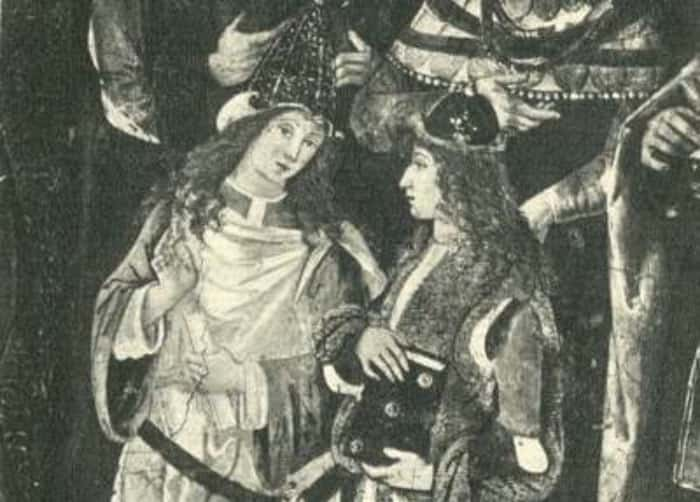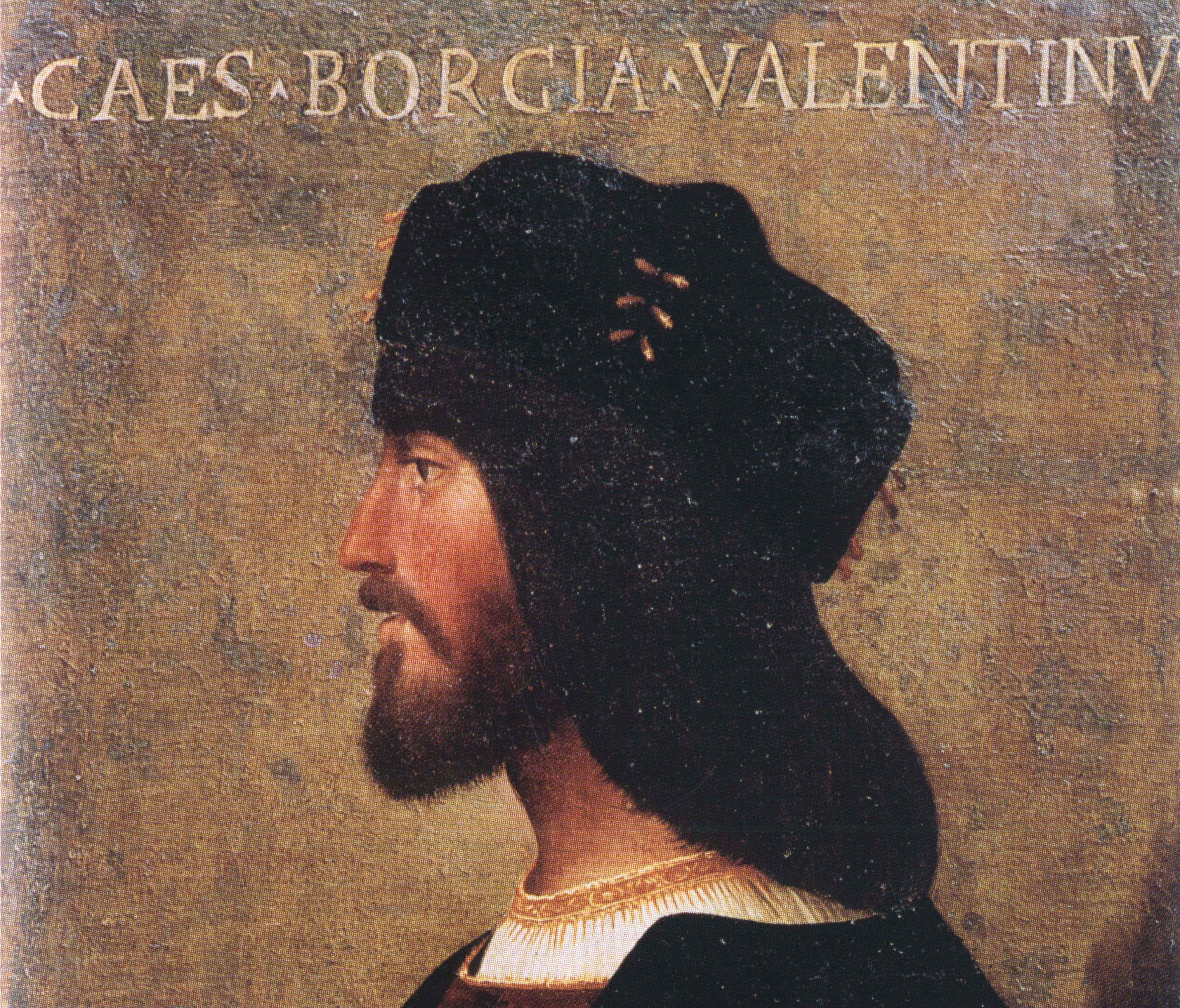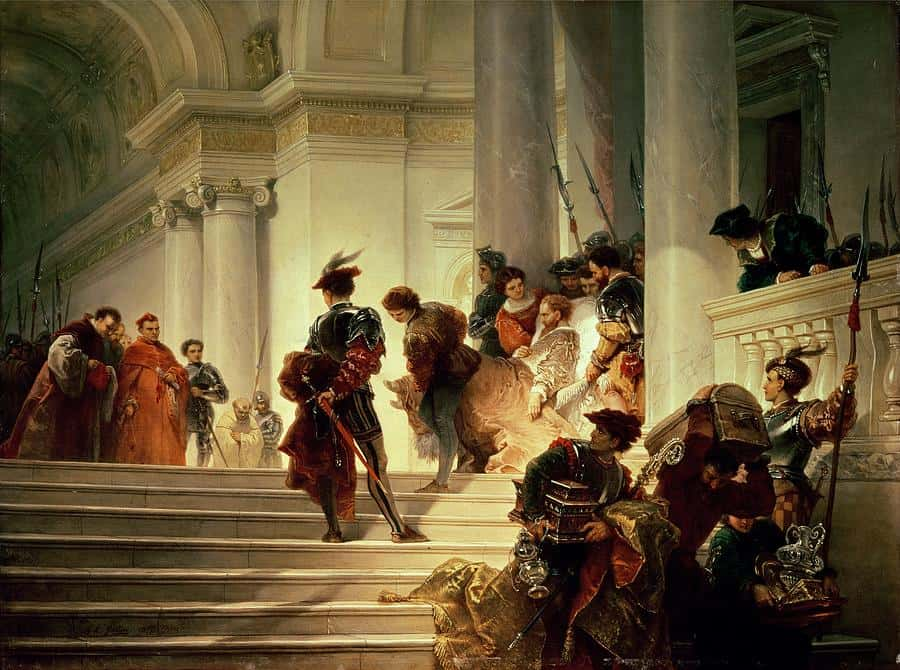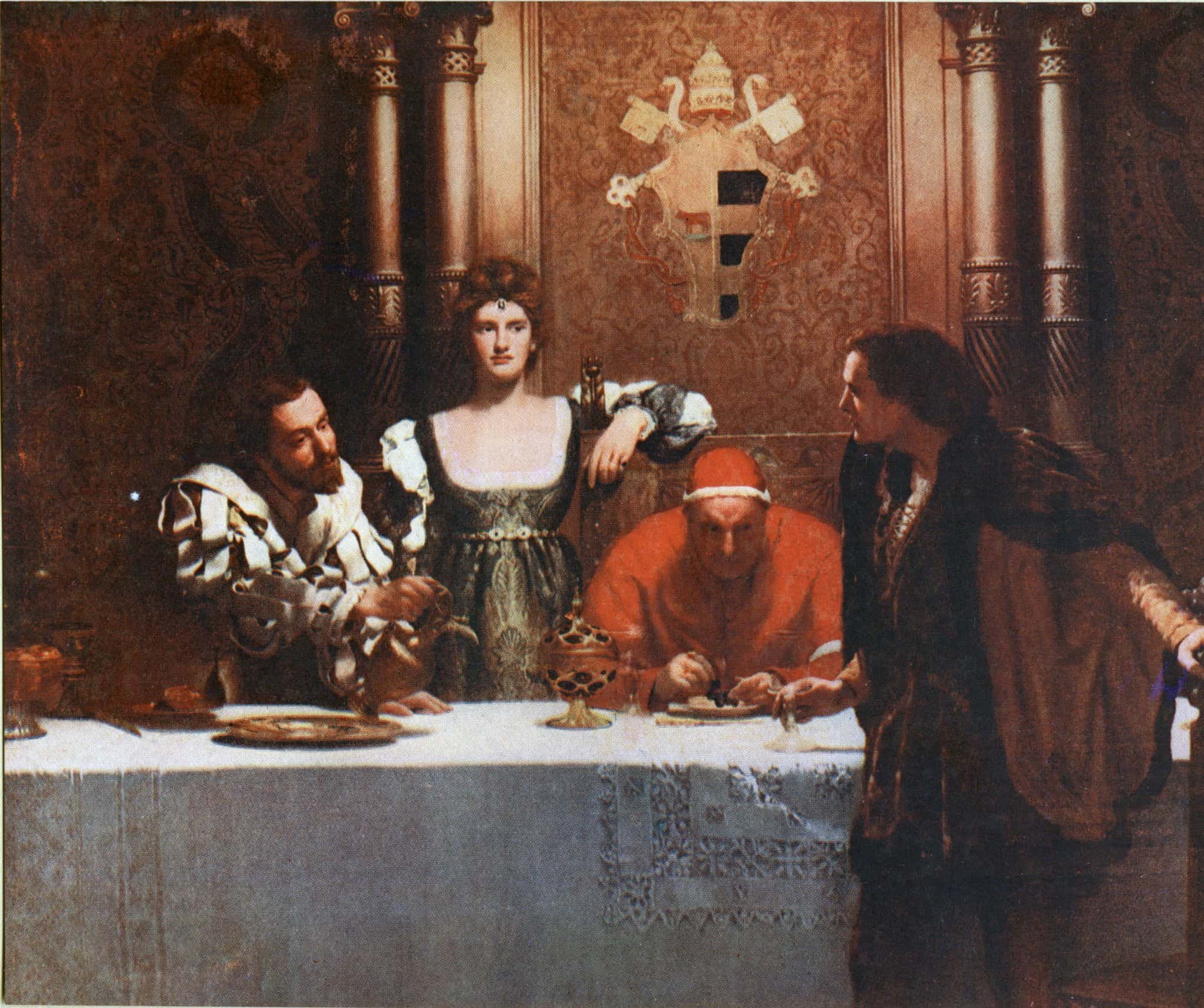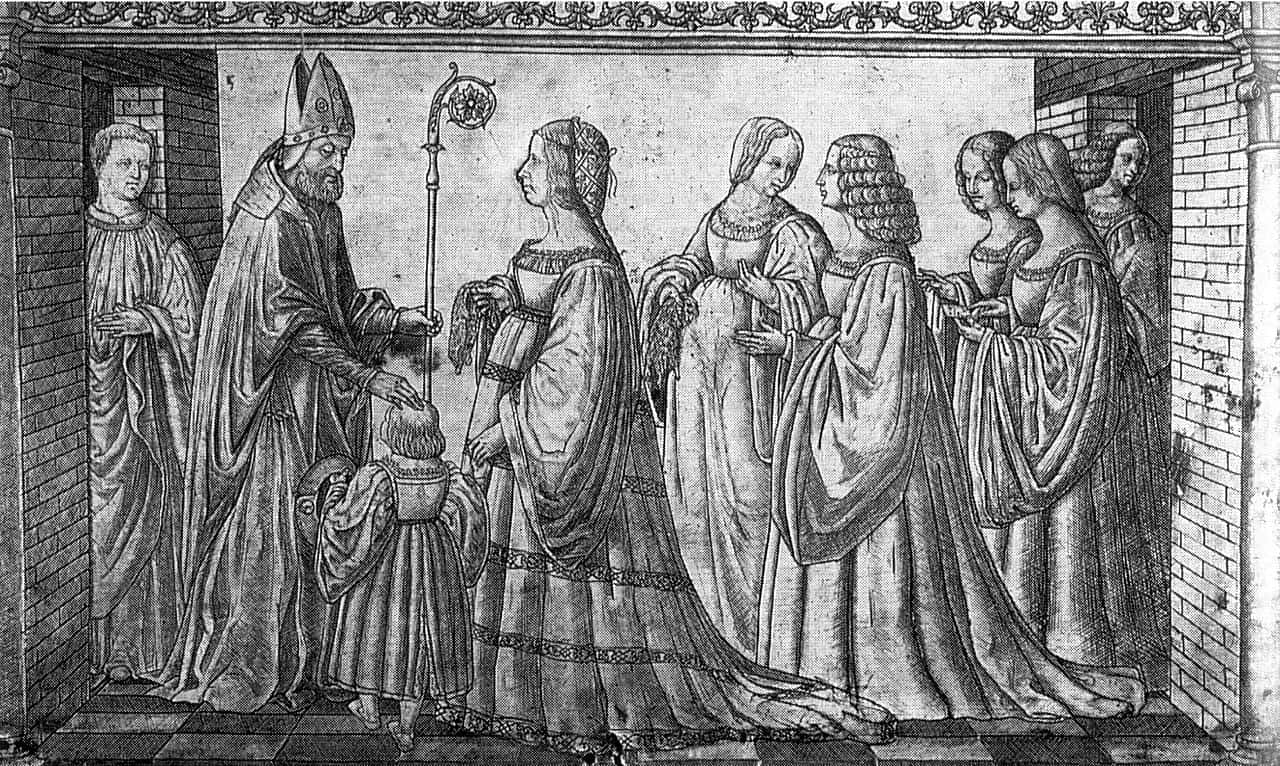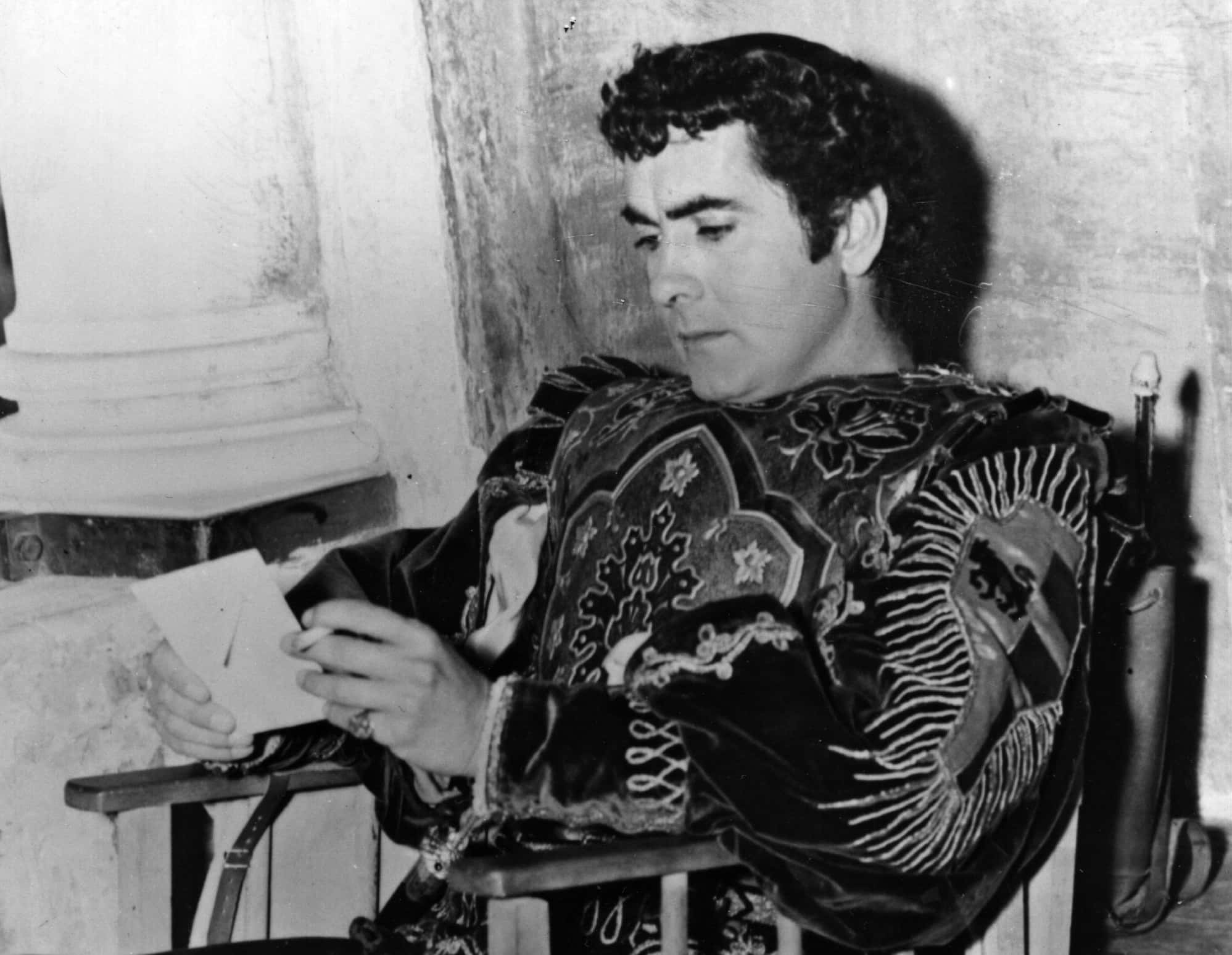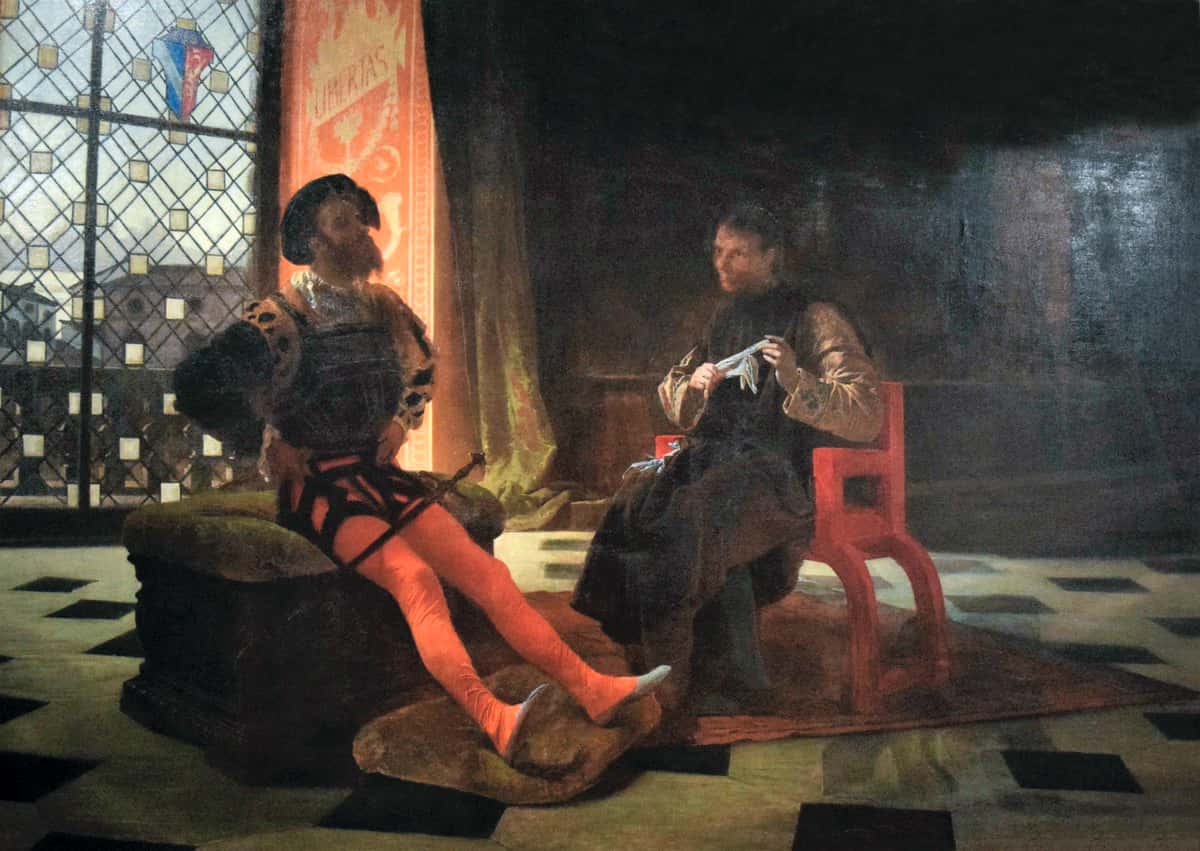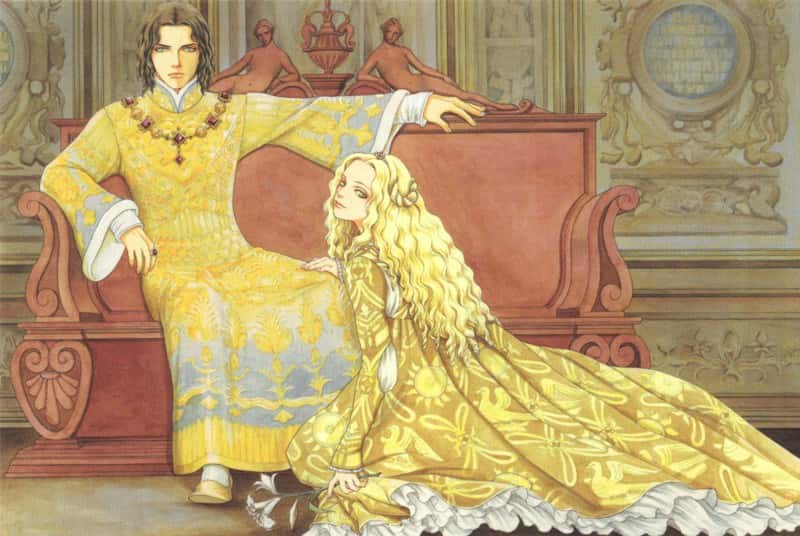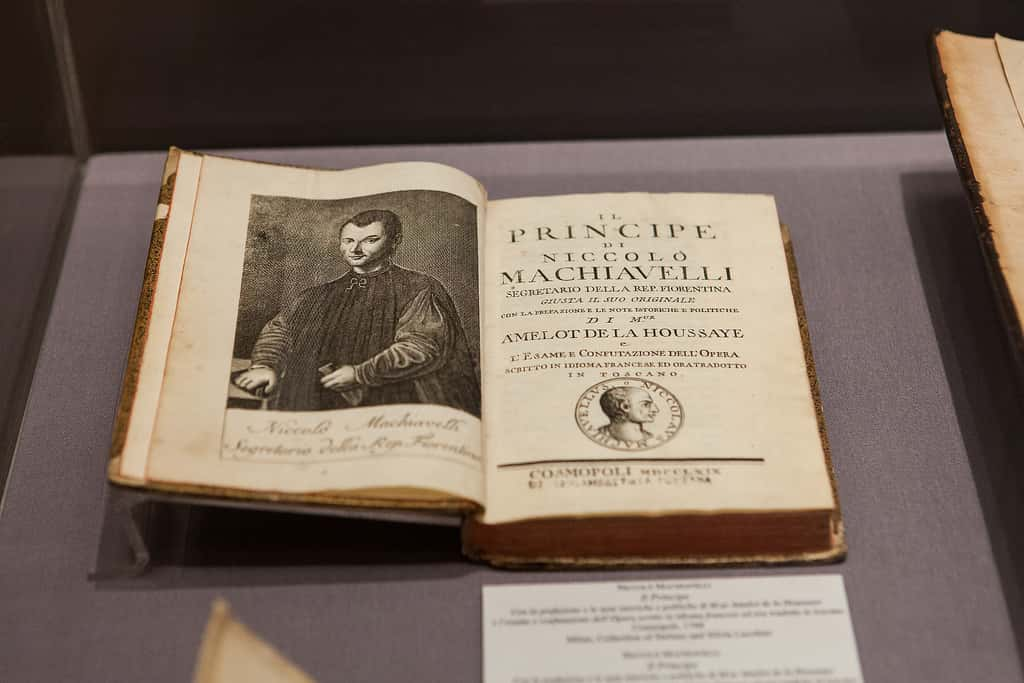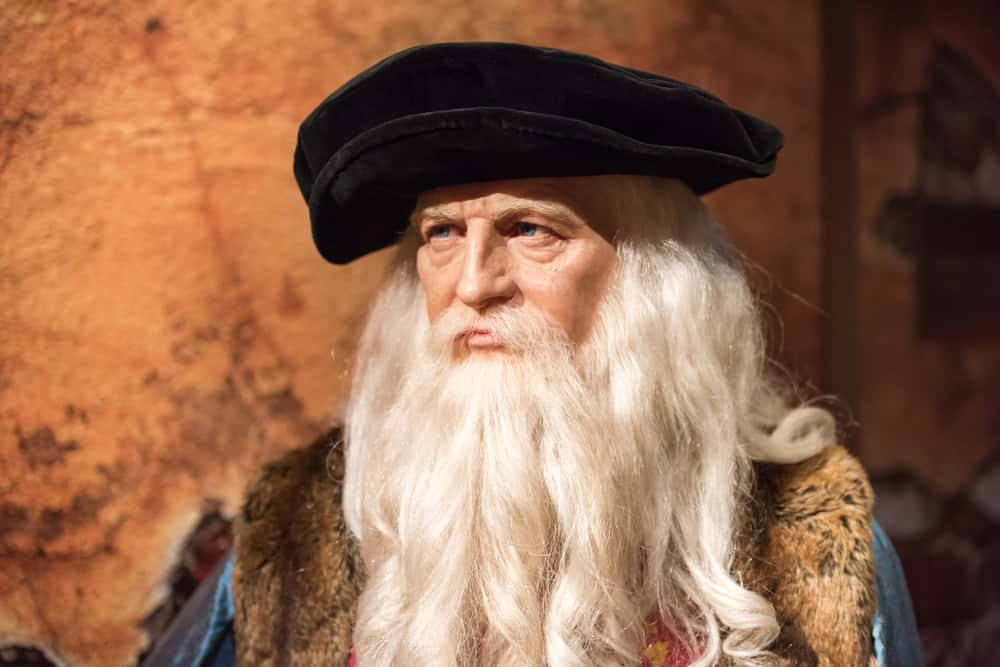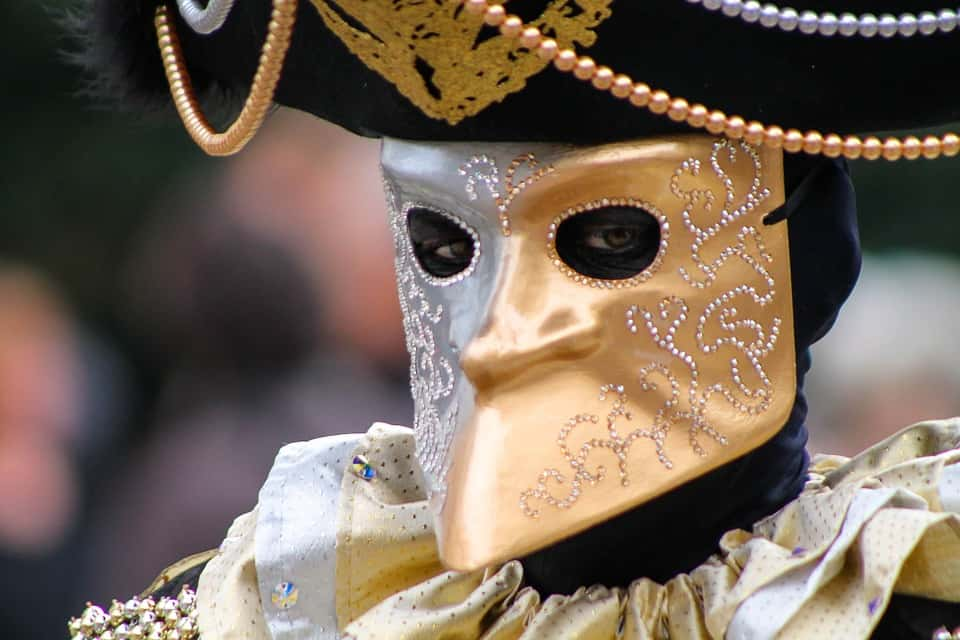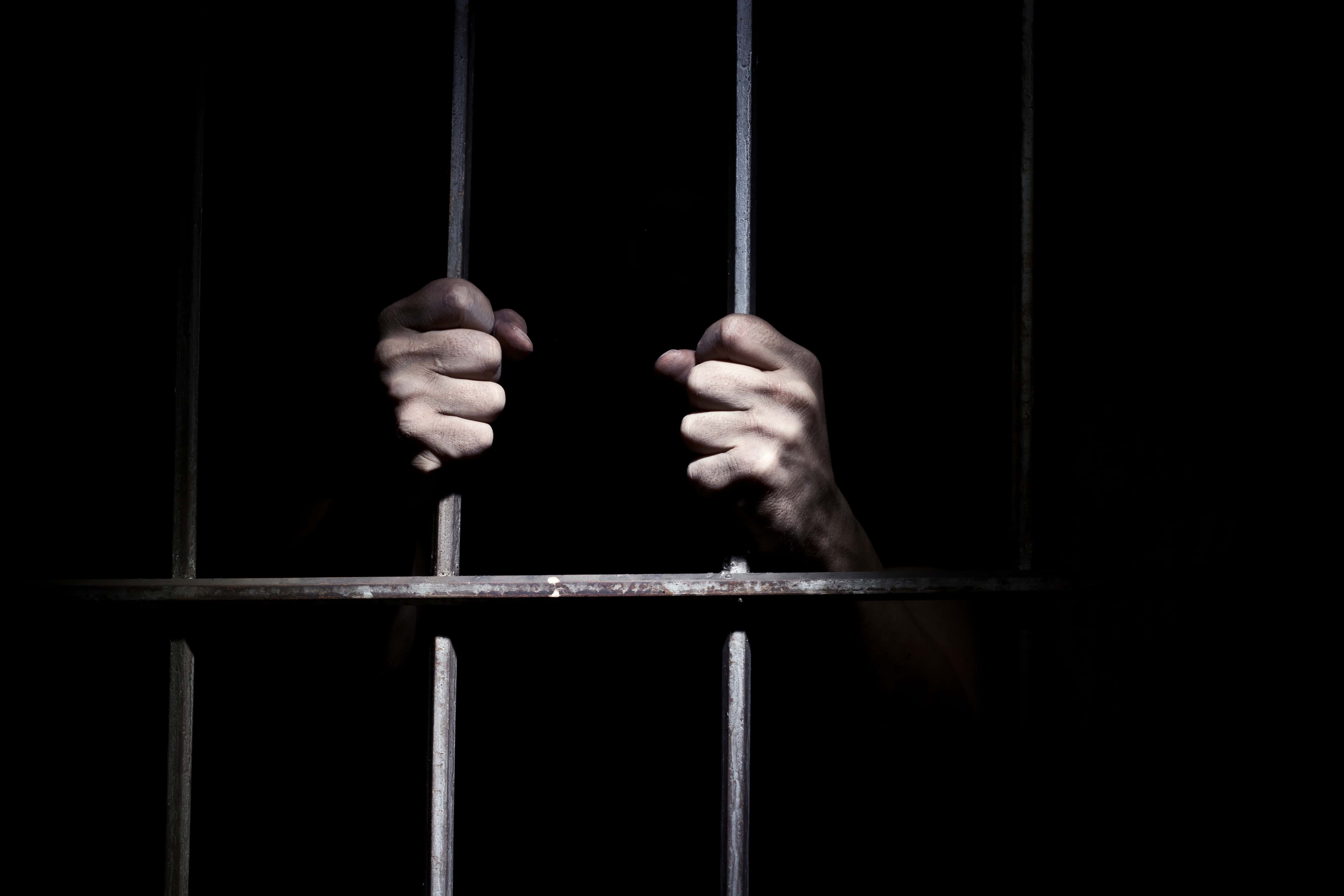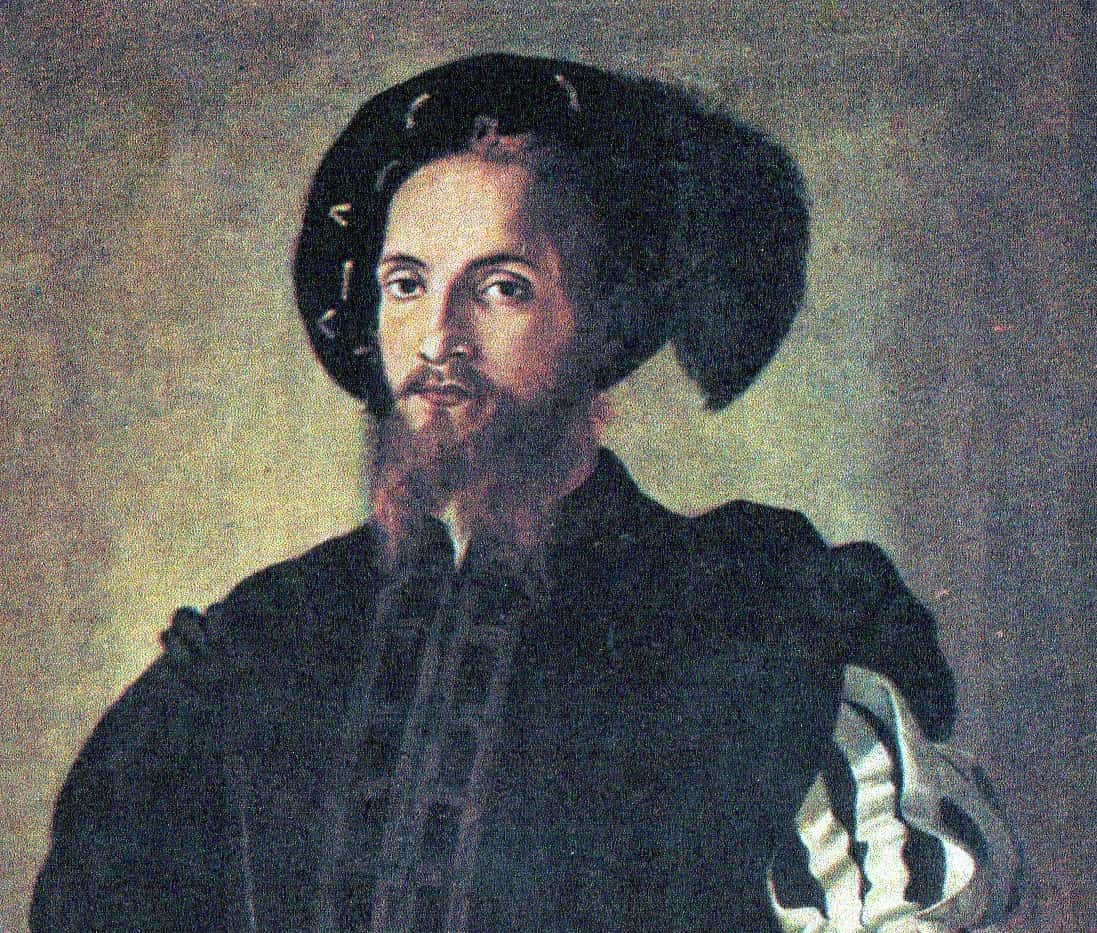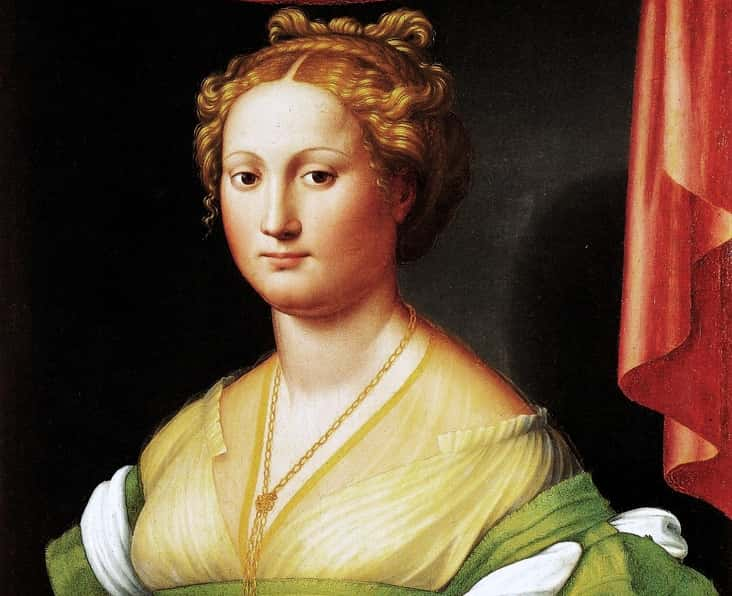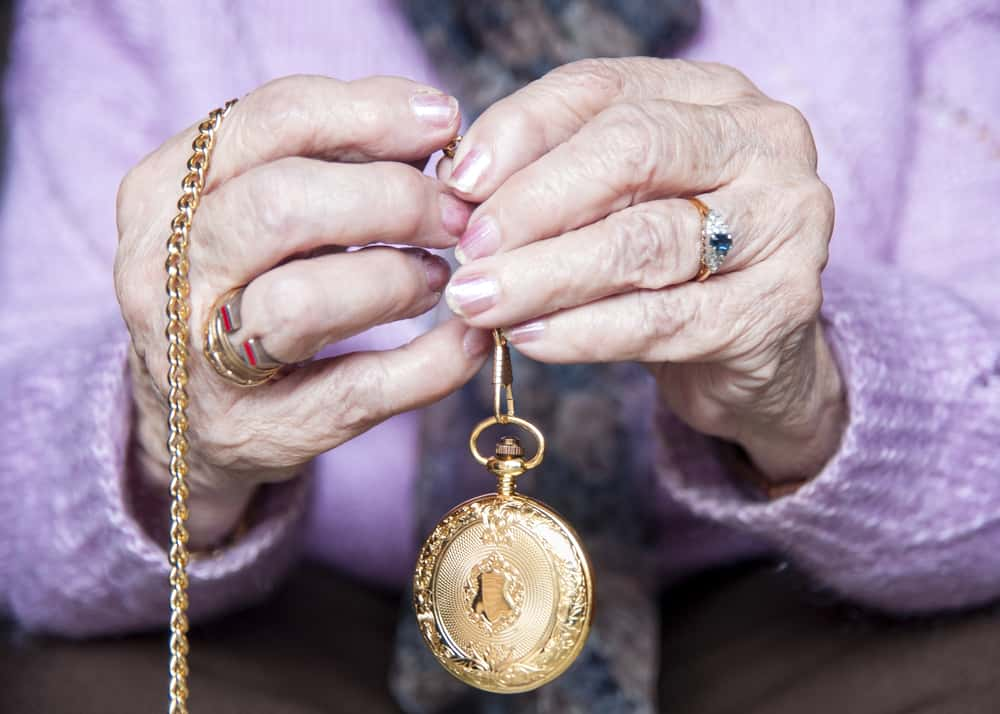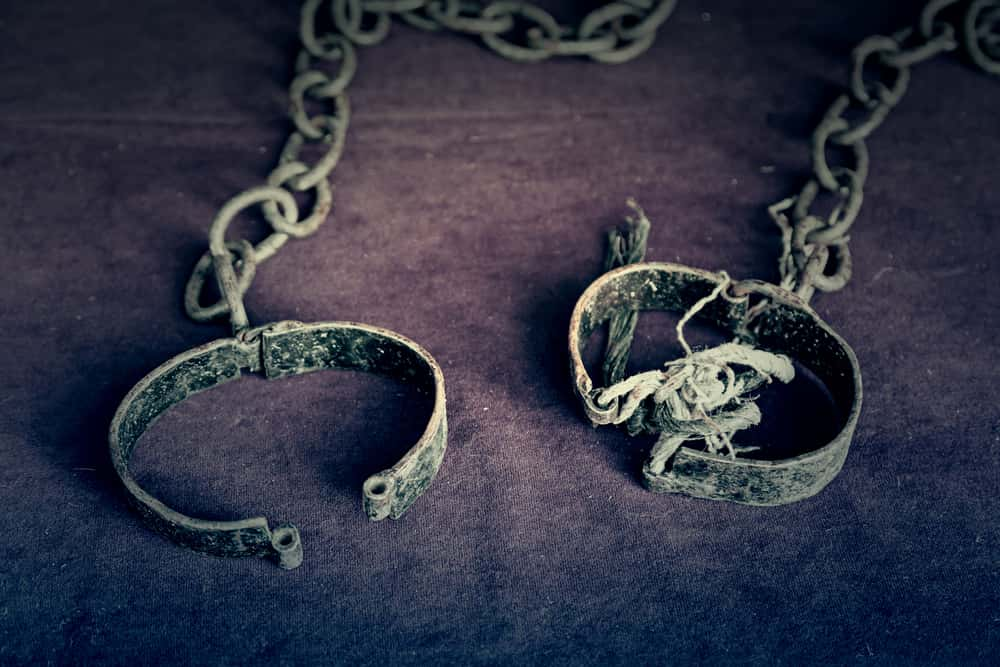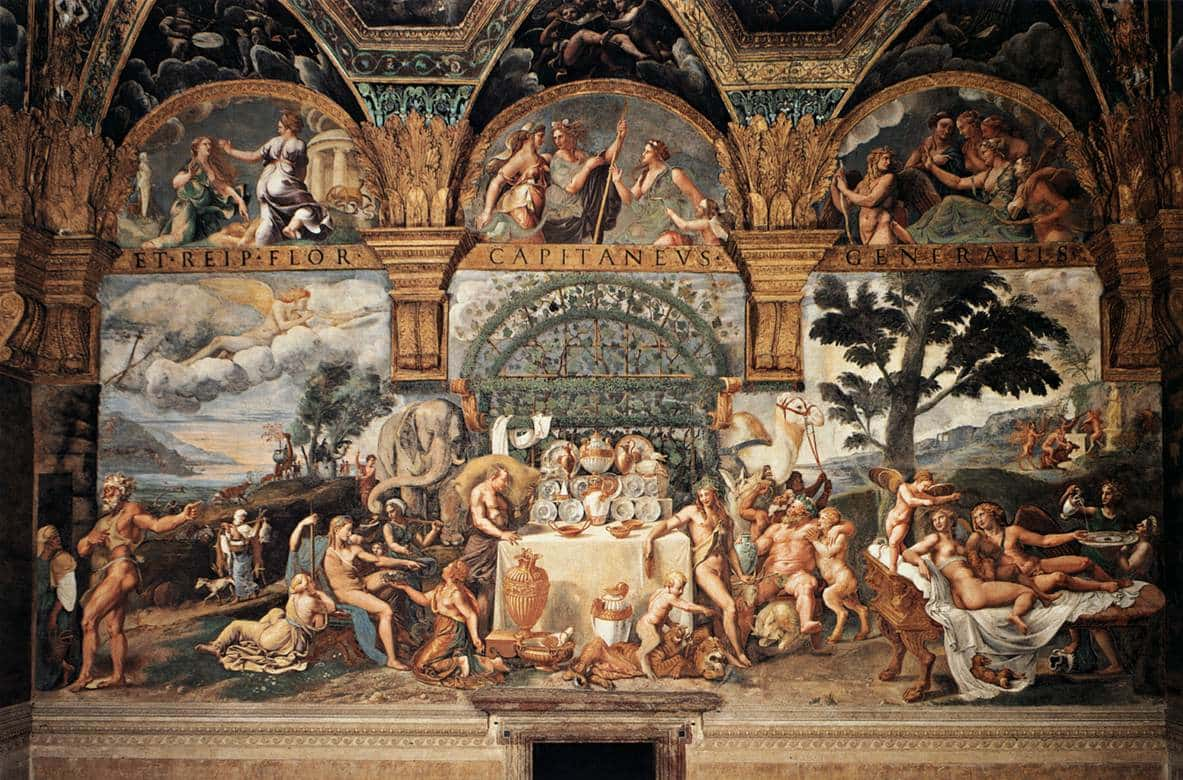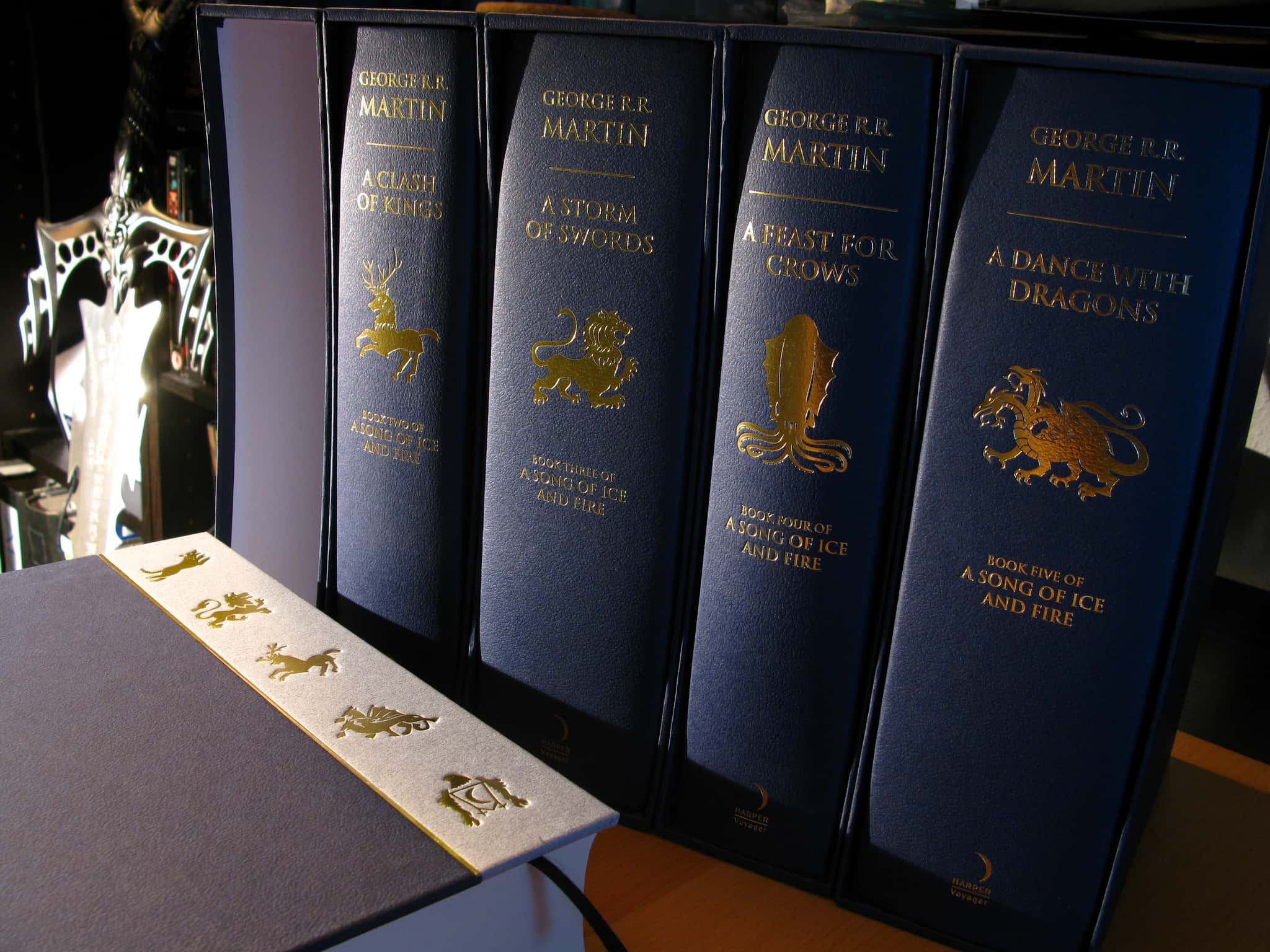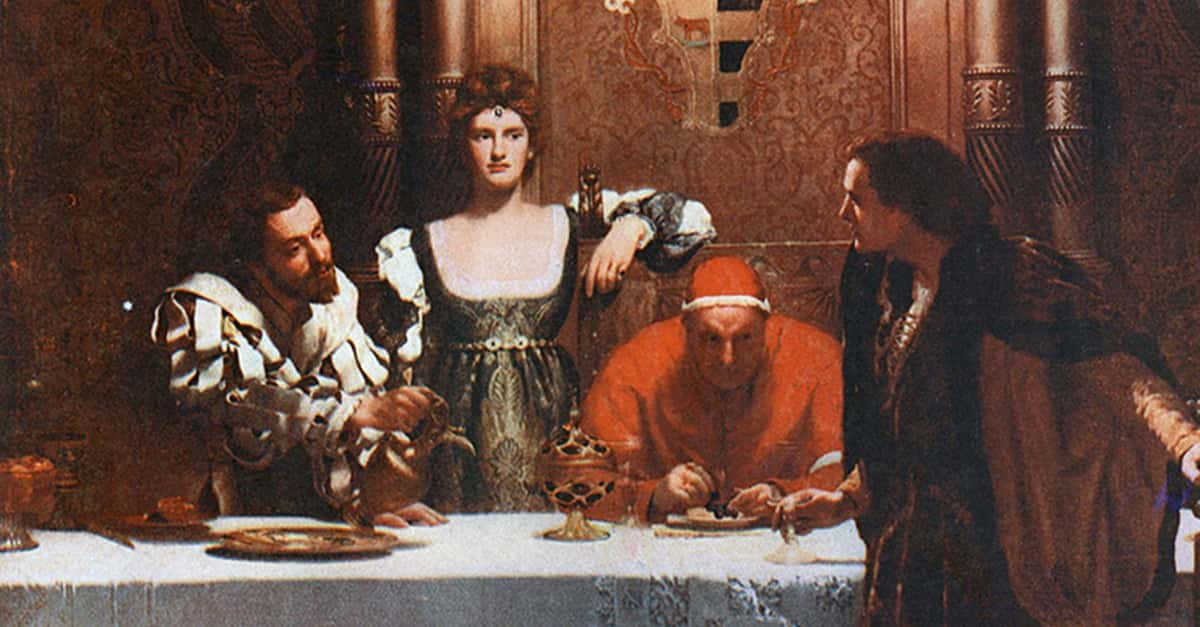You’ve probably heard about the Borgia family—their reputation has made them a symbol for corruption in high positions of power, and that’s not to mention the tales of complete moral corruption within their own family. While the patriarch of the family was immortalized when he became Pope Alexander VI, one of the more prominent members of this family was none other than his eldest son, Cesare Borgia.
Even in his own lifetime, Borgia was the subject of much writing, shrouding his life in infamous mystery. You might be wondering just what Borgia did to inspire such fascination (and loathing) from both his contemporaries and generations of historians and storytellers. Here are 42 sinister facts about Cesare Borgia.
Facts About Cesare Borgia
42. How Old Are You?
It’s not known exactly when Borgia was born, but what is known was that he was born in the city of Rome, either in 1475 or 1476.
41. Family Tree
Borgia’s father was Rodrigo Borgia, later Pope Alexander VI, and his mother was Vannozza dei Cattanei, one of Rodrigo’s mistresses. He had two brothers, Giovanni and Gioffre, and one sister, Lucrezia.
40. Are You My Mum- Er, Daddy?
While Borgia’s father, Rodrigo, was campaigning to become the new pope, he refused to acknowledge Vanozza’s children as his own. Instead, he claimed he was their uncle, and distanced himself from Vanozza. Despite this denial, however, Rodrigo doted on his children, bestowing gifts on them and treating them like his own.
After he was elected Pope, Rodrigo acknowledged his children, the first pope to ever do so in history. Naturally, this was highly controversial and only added to the infamy of the Borgias.
39. Lying Social Climbers
Borgia’s family was a noble house which originated from what was then the kingdom of Aragon. Specifically, their place of origin was said to be the town of Borja in the province of Zaragoza. Borgia and his family would claim that they were descended from the Pedro de Atares, a nobleman from Borja who tried to take the crown of Aragon for himself.
This, however, was a lie, because de Atares had died childless.
38. Schoolhouse Rock
While little is known for sure about Borgia’s childhood, what is known was that he was initially groomed to follow his father into the church. He lived for a time in the cities of Pisa and Perugia, attending school. Following this, Borgia returned to Rome and enrolled at the Studium Urbis. Nowadays, that facility is known as Sapienza University.
37. But Does It Rhyme?!
Borgia and his father, Pope Alexander VI, are both subjects in American poet Ezra Pound’s poem “Canto XXX.” No doubt they both would have been flattered by that, before asking who Ezra Pound is and what an American is!
36. Your Eminence
Incredibly, Borgia was only 15 years old when he became the Bishop of Pamplona. Two years later, he was made the archbishop of Valencia.
35. Intimate In-Laws
Borgia’s younger brother, Gioffre, was married to a woman named Sancha of Aragon, the daughter of the King of Naples. Sancha allegedly had affairs with both Borgia and a third brother, Giovanni. This must have made Christmas dinners even more awkward than usual!
34. They Also Called Me That Because I’m Italian!
Aside from his admittedly awesome-sounding name, Borgia had a nickname: Valentino. This stemmed from him being named the Duke of Valentinois by King Louis XII of France in 1498.
33. We’ll Never Know for Sure
It has long been believed that Borgia was in an incestuous relationship with his sister, Lucrezia. This rumor has frequently been used to sensationalize film and TV adaptations of the Borgias’ story. It must be maintained, however, that these rumors were first brought up by rivals to Borgia and the rest of his family. Whether he really did have an incestuous relationship with his own sister (and whether she was a femme fatale guilty of poisoning people) will likely never be proven or disproven. Certainly, he never confessed to any such thing in his lifetime!
 The Borgias, Showtime Networks
The Borgias, Showtime Networks
32. A European Alliance
In 2011, the French/Italian/Czech series Borgia was first released. Created by Tom Fontana (also known for his prison drama Oz), the series ran on a number of European channels, as well as Netflix. Borgia was portrayed in the series by Irish actor Mark Ryder.
 Borgia, Atlantique Productions
Borgia, Atlantique Productions
31. Was 2011 a Borgia Renaissance?
Curiously, that same year as Borgia came out, another TV series about the same family was released. The Borgias was a Canadian/Irish co-production and co-starred Francois Arnaud as Borgia. In the series, much is made of Borgia’s ruthlessness and his military genius, earning him a reputation as a feared man in his time. Not to mention, he was especially intimidating with Jeremy Irons playing his father! Bizarrely, both The Borgias and Borgia lasted three seasons after starting in 2011.
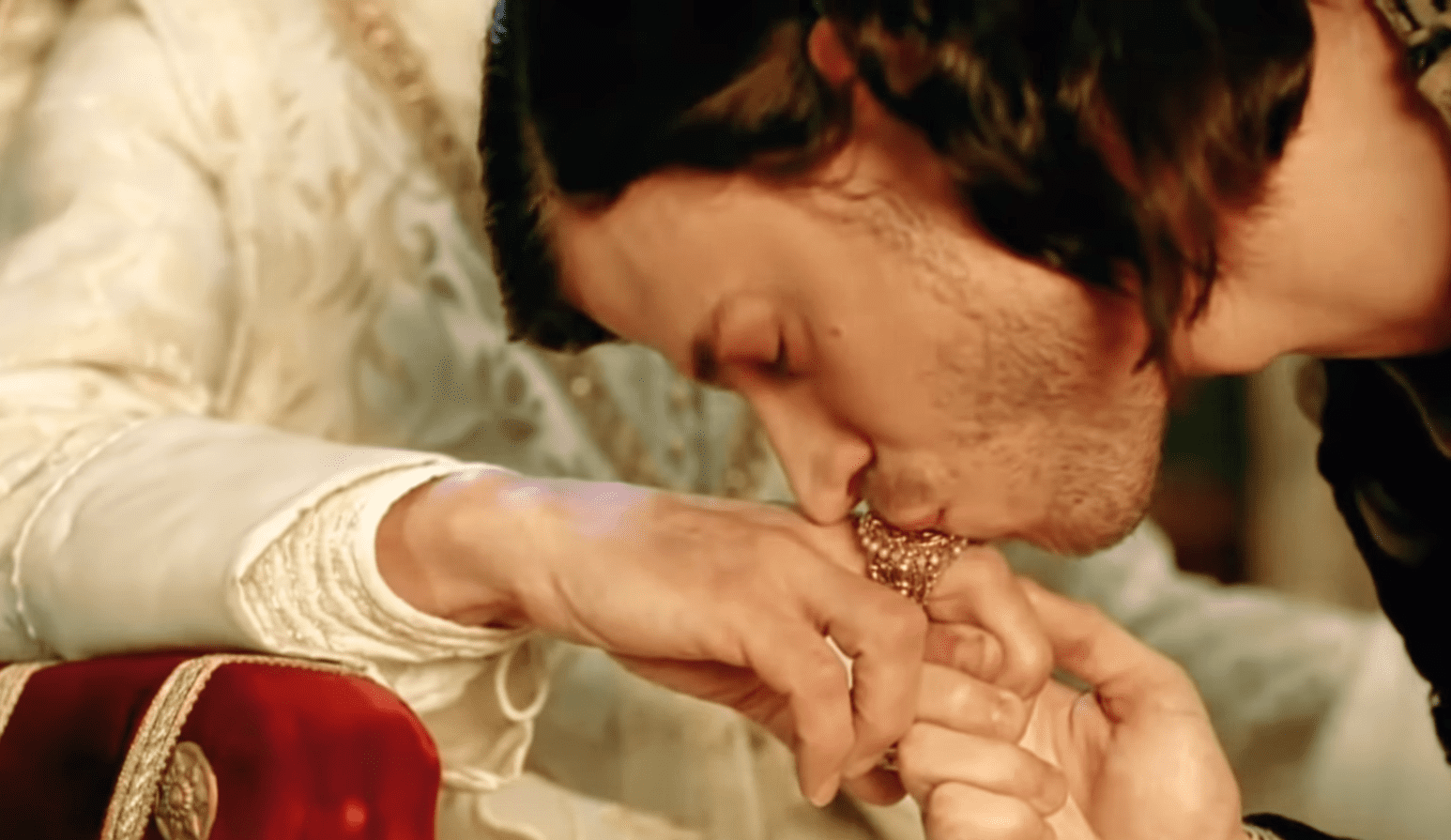 The Borgias, Showtime Networks
The Borgias, Showtime Networks
30. God is Dead, and So is Cesare
Borgia was a frequent subject in the writings of German philosopher Friedrich Nietzsche. Nietzsche would write about Borgia in no fewer than three of his books on philosophy: Twilight of the Idols, Beyond Good and Evil, and The Antichrist.
29. Poisoners?
It’s long been rumored that Borgia assisted his father in poisoning their political enemies, especially Cardinal Adriano Castellesi. However, there is no clear evidence that this is true. The closest thing to testimony to support these crimes stem from several former Borgia servants who were tortured into giving their confessions.
Given the nature of torture, we definitely need to take this with a grain of salt.
28. Pucker Up!
The first time that Borgia was portrayed in a film was in the 1926 period piece Don Juan, based loosely on the poem by Lord Byron. Borgia was played by Warner Oland. The film was not only Warner Bros.’ biggest financial success at the time, but it holds a record for the most kisses in film history. John Barrymore kisses his female co-stars a total of 127 times.
27. Married for Money
On May 10, 1499, Borgia was married to Charlotte of Albret, who was the sister of King John III of Navarre. It was hardly a romantic relationship; Charlotte was rich, well-connected, and Borgia needed a political tie to King Louis XII of France. Sure enough, after their marriage, Borgia accompanied the king when he invaded Italy.
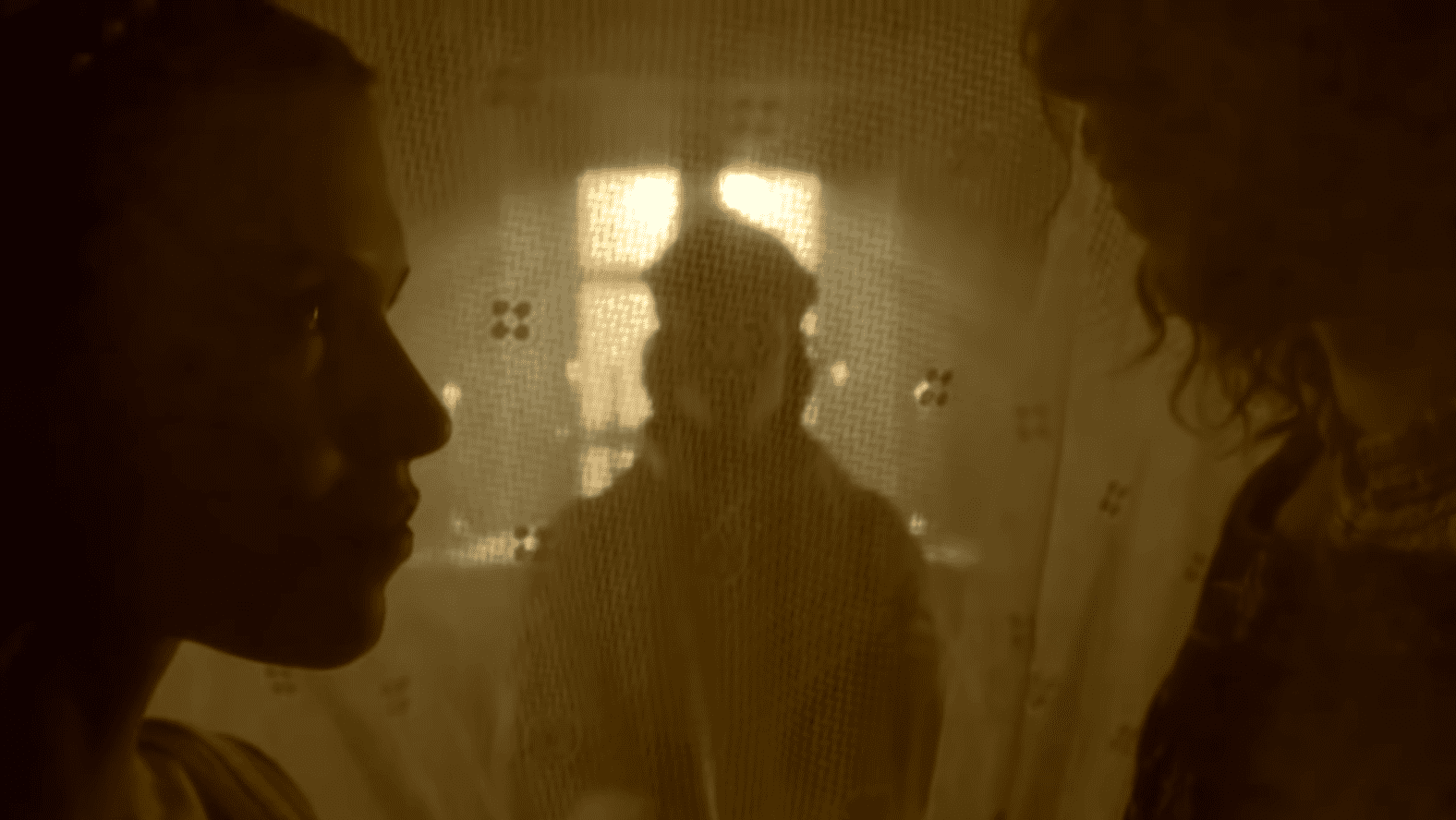 The Borgias, Showtime Networks
The Borgias, Showtime Networks
26. Oy Vey!
Despite the fact that his father was the elected leader of the Catholic Church, rumors have persisted that Borgia’s family was actually of Jewish background. While this could be true, it could also equally have been slander that their enemies invented to undermine them.
25. Isn’t Nepotism Great?
With his father as the Pope, Borgia became the leader of the Papal office’s military, which included Italian mercenaries and thousands of Swiss troops. Borgia spent part of 1499 conquering the Italian cities Imola and Forli, making them directly answerable to the Pope. Of course, Cesare Borgia was made to rule these regions.
24. This is Why You Don’t Mix Family and Politics
Because of Borgia’s allegiance to the King of France, this made him an enemy of the Italian city of Naples. As it turned out, the second husband of Borgia’s sister, Lucrezia, happened to be Alfonso of Aragon, the King of Naples. The same one whose sister was sleeping with Cesare and his brother Giovanni while married to his other brother Gioffre.
In 1500, Alfonso of Aragon was murdered, and his killer was never identified. It was long rumored that Borgia was either directly or indirectly responsible for Alfonso’s death, either because of his alliance with France or, because they simply had no need for him anymore.
23. Out of Wedlock
Borgia was known to have had at least 11 illegitimate children outside of his marriage. One of them was a girl named Lucrezia, named after her aunt. After Borgia’s death, Lucrezia would end up moving to live with her namesake. No word on whether any of Borgia’s children got the last name “Snow.”
22. Keeping it in the Family
Speaking of illegitimate children, Borgia had a few illegitimate half-siblings of his own, thanks to his father’s carnal desires. One of them was Pier Luigi de Borgia. He married a noblewoman named Maria Enriquez de Luna, but his life was cut short unexpectedly. His widow would go on to marry Borgia’s younger brother, Giovanni, and had three children with him before his murder.
21. Citizen Borgia
In 1949, Hollywood released the historical film Prince of Foxes, starring Orson Welles as Borgia and Tyrone Power as a young man who serves Borgia but becomes alienated by Borgia’s bloodthirstiness and plots against him. The film was a big success financially and was nominated for two Oscars.
20. Apple of Her Daddy’s Eye
Borgia’s daughter, Louise, was born on May 17, 1500. She was the only legitimate child born to Borgia and his wife, Charlotte.
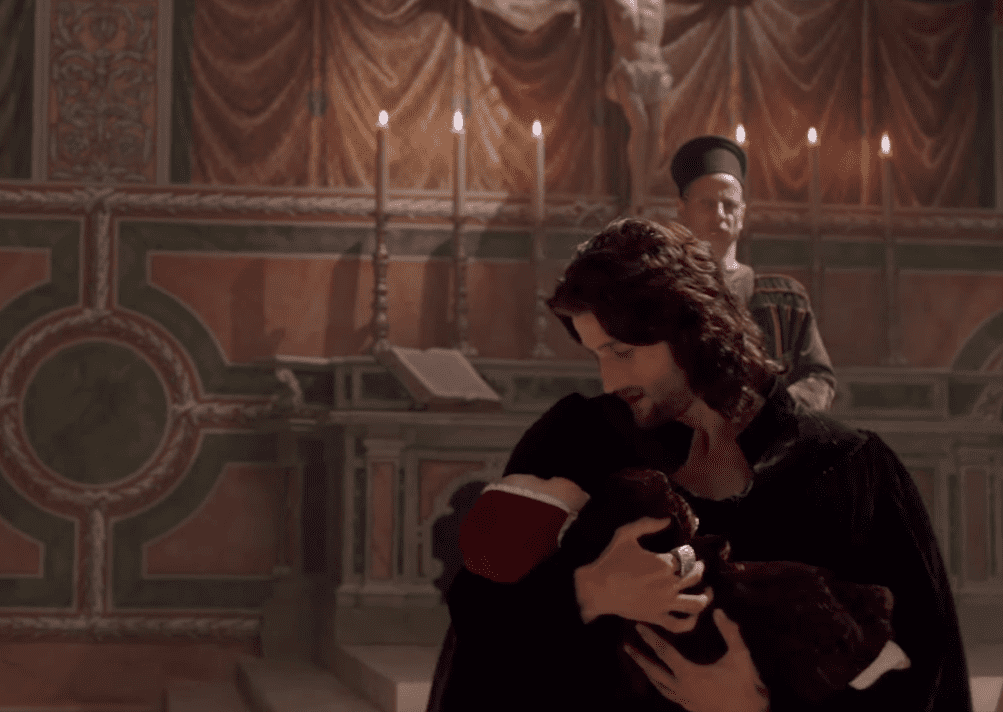 Borgia, Atlantique Productions
Borgia, Atlantique Productions
19. Named for the Star
Borgia was the subject of a play by English playwright Nathaniel Lee. Titled Caesar Borgia, the play was first performed in 1680, and depicts Borgia’s interactions with Niccolo Machiavelli, who is credited as “Machiavel.”
18. A Man of Many Titles
Thanks to his military conquests (and his father’s extensive influence), Borgia held a number of titles in his life. Among them were the Duke of Romagna, the Count of Diois, the Prince of Andria, and the Prince of Venafri.
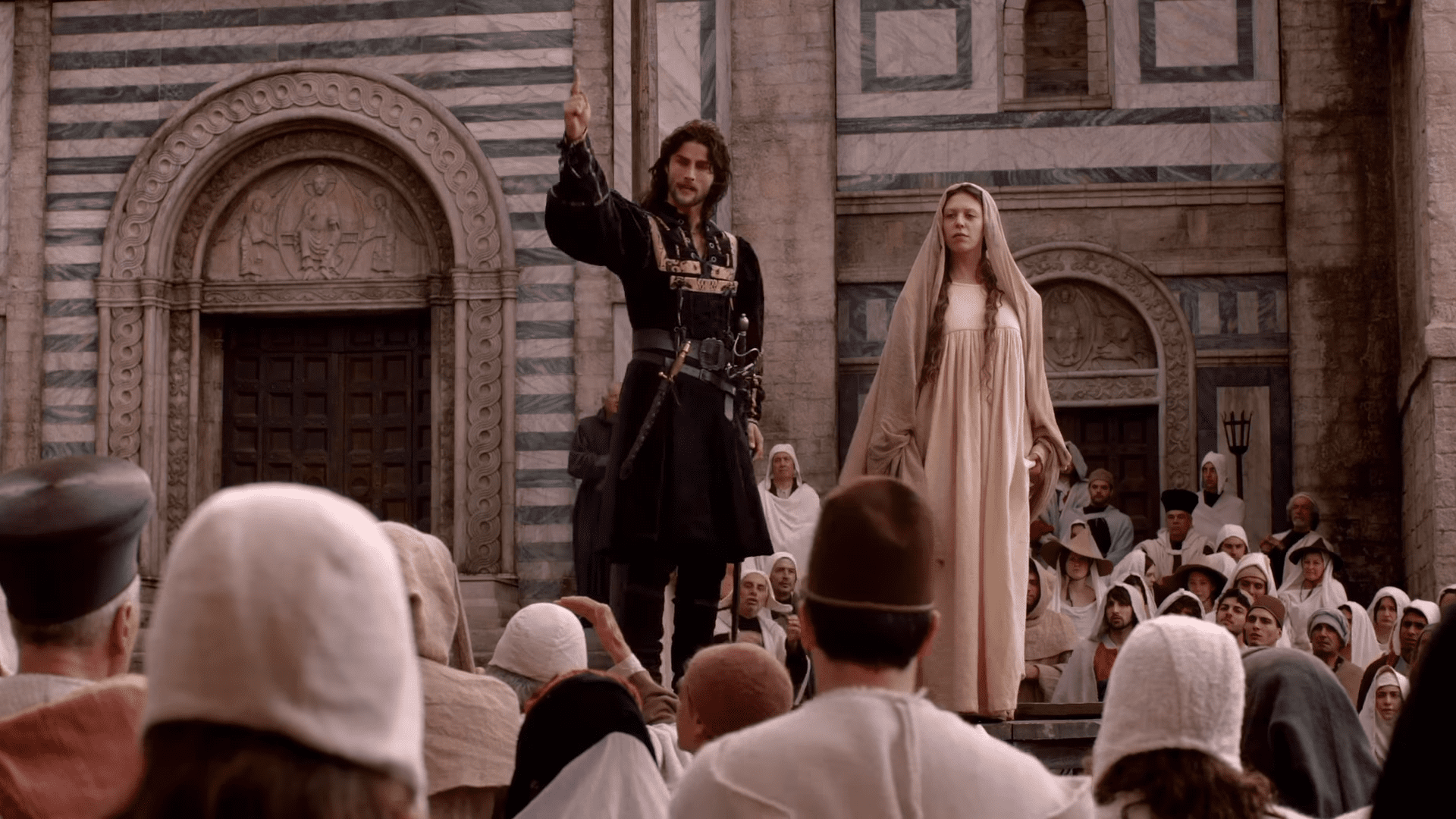 Borgia, Atlantique Productions
Borgia, Atlantique Productions
17. Your Welcome Into the Family Has Worn Out
In yet another example of Borgia making things super awkward within his own family, despite family supposedly being so important to the Borgias, Cesare was supposedly involved in a plot to kill Giovanni Sforza, who was the first husband to his sister Lucrezia. Sforza and Lucrezia’s union in 1493 had been a political one, but after a few years of marriage, Sforza was no longer useful.
Allegedly, Borgia went to his sister and informed her that Sforza’s days were numbered, and Lucrezia passed on the warning to her husband, who got out of Rome before the plot could be carried out. In 1497, he was pressured into signing papers of annulment.
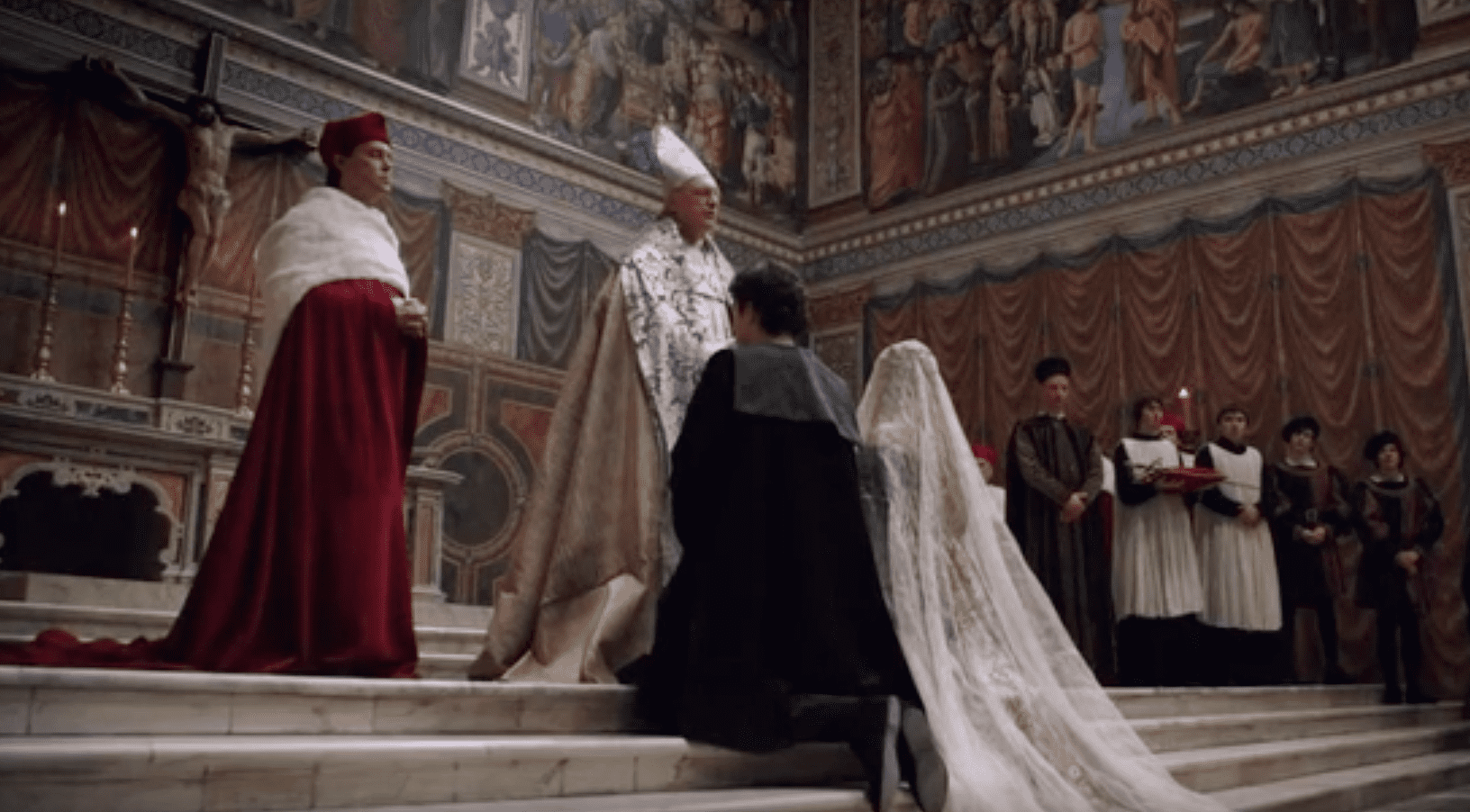 Borgia, Atlantique Productions
Borgia, Atlantique Productions
16. The Turn of the Tide
In the summer of 1503, Borgia’s plans for more military conquests was interrupted by a serious illness which nearly killed him. He and his father, Pope Alexander VI, were both bedridden and feverish, though the exact cause has never been confirmed. While Borgia survived, however, his father did not. This proved to be the beginning of the end for all that Borgia had achieved in his life up to that point.
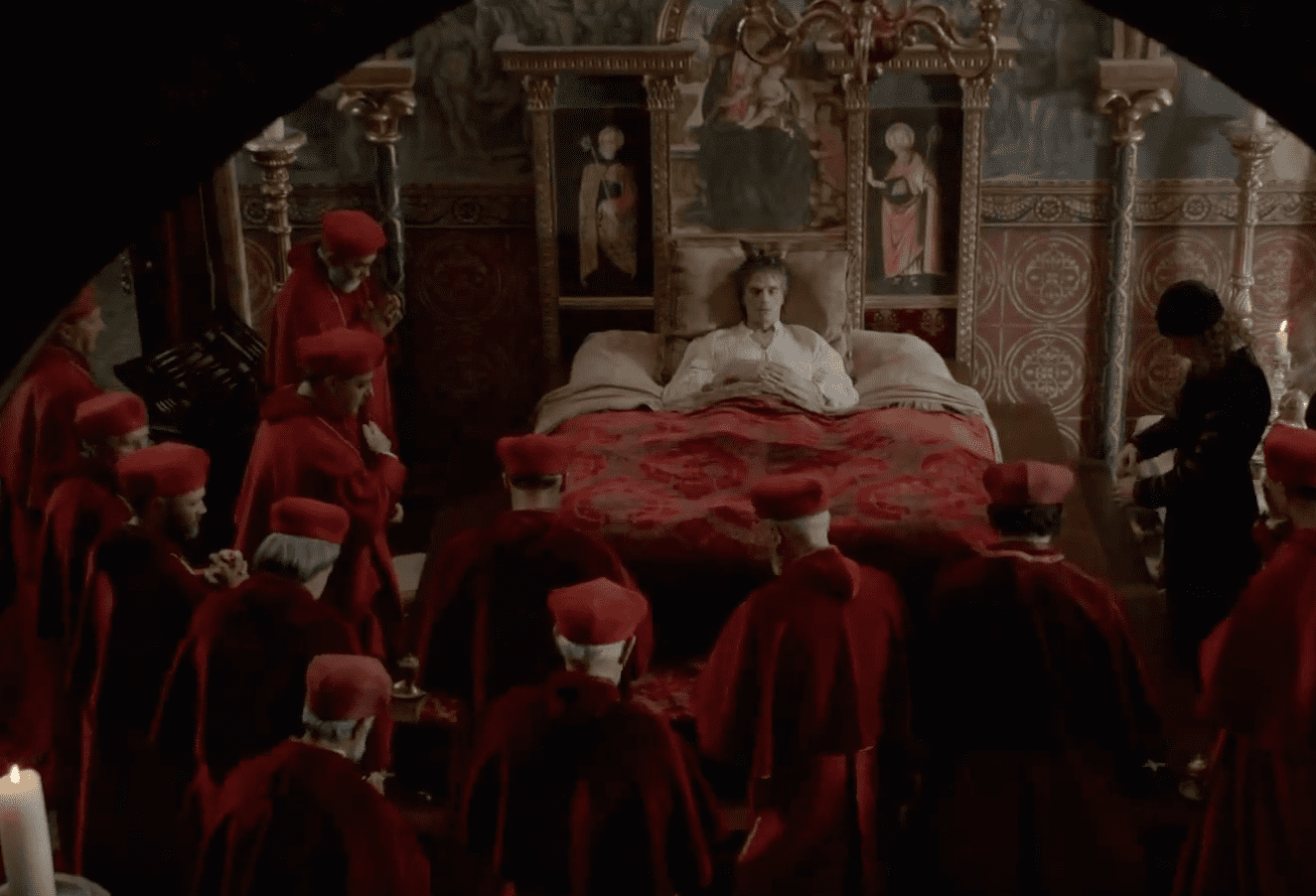 The Borgias, Showtime Networks
The Borgias, Showtime Networks
15. Cesare Goes to Japan
Believe it or not, Borgia has been the subject of three different manga from Japan. The earliest, Kakan no Madonna, debuted in 1993, while Cantarella ran from 2001 to 2010. The third, Cesare, is focused on Borgia’s youth in the Church and onwards (just like Kakan no Madonna had done) and began in 2005. Created by manga artist Fuyumi Soryo, Cesare is still ongoing as of January 2019.
14. A Grave Mistake
With the death of his father, Borgia’s authority depended on whoever would be elected as the new Pope. Pope Pius III did support Borgia, but he passed away after serving as Pope for less than a month. In an act of things going around and coming around, Borgia was manipulated into supporting Giuliano Della Rovere, an enemy of his family, into being elected Pope Julius III.
Once secure in his position, Pope Julius III immediately reminded Borgia that there were still hard feelings. All the support of the Papal Office for Borgia’s campaigns and military holdings was withdrawn.
13. When Cesare Met Niccolo
From 1502 to 1503, while Borgia and his father, Pope Alexander VI, were embroiled in their military campaigns in central Italy. Also during that time, a diplomat from the newly made democratic city-state of Florence traveled to Borgia’s camp. This diplomat, who bore witness to Borgia for part of a year, was none other than Niccolo Machiavelli.
12. You’ll Be Useful to Me
Niccolo Machiavelli would not forget his time with Borgia when it came time for him to write his most famous work, The Prince. In the book, Machiavelli would often return to the example of Borgia when discussing the use of church power in secular politics. While much has been said about Machiavelli inspiring the term “Machiavellian,” a very strong case has been made that Machiavelli’s book was entirely satirical.
In fact, his use of Borgia as a supposed shining example has been noted by several writers that he’s clearly being sarcastic, given Borgia’s “detestable” reputation.
11. What About the Other Teenage Mutant Ninja Turtles?
As if it wasn’t fascinating enough that Borgia was working alongside Niccolo Machiavelli between 1502 and 1503, the time period also saw Borgia employing the legendary inventor Leonardo da Vinci! Borgia hired da Vinci to serve as an engineer, giving him full creative control. Da Vinci designed and built a canal between Porto Cesenatico and Cesena.
10. Don’t Forget to Use a Rubber!
It was said that for a time near the end of his life, Borgia covered half his face with a mask made out of leather. It’s unknown why he did this, but a likely explanation is that his face had been scarred by syphilis.
9. At Least Family Counts for Something!
Following the election of Pope Julius III and the removal of Papal support, Borgia’s power collapsed immediately. In 1503, he was betrayed by a former ally and imprisoned. He was transferred as a prisoner across Spain before finally escaping and fleeing to Pamplona in 1506. Due to his military reputation and their pre-existing relationship, he was taken in by King John III of Navarre.
It was under John III’s service that Borgia would embark on the last campaign of his life.
8. An Undignified Death
Borgia’s demise came about while he was besieging the Castle of Viana on March 11, 1507. At one point, a group of knights tried to escape the castle during a storm, only to be chased by a furious Borgia. Unfortunately, his temper got the better of Borgia when he ran far from the safety of his own army, leaving him vulnerable.
The knights he was chasing realized this at the same time as Borgia, and quickly turned on him. He was stabbed to death and stripped of his jewelry and fancy clothes.
Once a highly feared and hated military leader, Borgia was left a cold, naked corpse in the middle of a violent storm.
7. No Parent Should Survive Their Child
Borgia was survived by his mother, Vannozza dei Cattanei, who managed to outlive all her sons. Only Lucrezia would live long enough to bury Vannozza after her death in November 1518.
6. Live Longer and Prosper
When Borgia was killed, his daughter and heir, Louise, was only 7 years old. Her mother acted as regent for the young Duchess of Valentinois until her own death when Louise was 14. Louise would go on to marry twice and have six children before she died in 1553. She managed to live longer than both her parents did by about 20 years. That sounds like progress to us!
5. O Brother, Who Killed Thou?
On June 14, 1497, Borgia’s brother Giovanni was murdered. He was last seen with Cesare and the rest of the siblings in their mother’s home. Giovanni then departed and was never seen alive again. The next morning, his horse returned home riderless. He was later found in the Tiber River, having had his throat slit and having been stabbed nine times.
4. Did Someone Interrogate the Butler?
In the aftermath of his brother’s murder, Borgia’s father was devastated, and insisted on a thorough investigation into the murder. However, just a week into the case, Pope Alexander VI called the whole thing off. This might seem suspicious for a man whose son was murdered and who had the power of the Church behind him, but keep in mind that because Giovanni had been having an affair with Sancha, both of his brothers were therefore suspects.
3. My Brother’s Dead, I Quit
One other reason why Cesare Borgia might have had a hand in killing his brother is the fact that Giovanni was being groomed for military command by Pope Alexander VI, their father. Indeed, because nepotism was entirely the way that Borgia’s family rolled, Giovanni had been given the rank of captain-general over the papacy’s military forces.
Just over a year after his brother’s murder, Cesare Borgia became the first man in history to resign his position as a cardinal, and became more involved in the military.
2. Feast of the Chestnuts
Before Cesare Borgia’s wild lifestyle caught up with him, leaving him ravaged by syphilis, he was known to have sensual parties at the Vatican, where guests would be encouraged to make use of the “fifty honest prostitutes” who had been invited. The Banquet of Chestnuts, as it was known, was a massive feast and sexual marathon that took place in October 1501. The pope himself was said to be in attendance, and prizes were given to those who could "perform the act most often with the courtesans."
1. A Borgia Always Pays Their Debts
George R.R. Martin’s A Song of Ice and Fire series (also known as the inspiration for HBO’s Game of Thrones) has famously been inspired by the Wars of the Roses in England, with some pointing to the parallels between the House of Lancaster and House Lannister in Westeros. However, a very strong case has been made that the Lannisters bear stronger similarities to the Borgia family, including Cesare.
His alleged involvement in the murder of his own brother, the alleged relationship with his own sister, and his ruthlessness as a military leader all share similarities with the storylines of Jaime, Tyrion, and Tywin Lannister. And like Cersei, Borgia proved to be vulnerable after the death of his father, whose intellect had helped to steer his violent son in the right direction without being killed.
Sources: 1, 2, 3, 4, 5, 6, 7, 8, 9, 10, 11, 12, 13, 14, 15, 16, 17, 18, 19, 20, 21, 22

